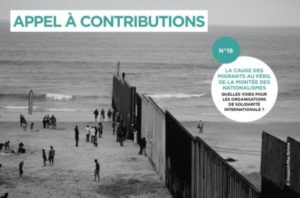The cause of migrants under threat from the rise of nationalism: which directions for international solidarity organisations?
A Focus co-directed by Clara Egger, Assistant professor at the University of Groningen and director of studies of the EMJMD Master in International Humanitarian Action, and Boris Martin, Editor-in-Chief of Humanitarian Alternatives
The end of the Second World War gave rise to a marked amplification of international cooperation, which has intensified since the beginning of the 1990s. A great number of international organisations, in France and abroad, were founded during this half-century marked by hope of greater solidarity between peoples, societies and economies. In particular, the cause of migrants has always been one of the main axes of this international solidarity project. Since 2015, and what has become known as the “migrant crisis”, this project has faced opposition from a strong political current that has affected every continent and is characterised by a rise of nationalism. Opening up a “reception crisis”, this has essentially crystallised around the issue of migrants.
Whether it be the election of Donald Trump in 2016, which made Muslims and Mexicans out to be the cause of America’s troubles, or of Geert Wilders, the leader of the Freedom Party and a former member of the governmental coalition seeking to put an end to the “Islamification” of the Netherlands, or of Viktor Orban, connected to the project of building an anti-migrant wall in Hungary, these parties all share an isolationist, nationalist and racist rhetoric which has been at the heart of their election successes since 2010. France has not been spared, and the beginning of the 2022 electoral season has already been marked by the preponderance of authoritarian and identity questions. In Asia, the exodus of the Rohingyas fleeing violence by the Burmese authorities has left them without status or protection in Bangladesh. In South America, the Venezuelan crisis has led Brazil and Ecuador to close their borders.
This new political climate has already had serious consequences for humanitarian actors. In Norway and Sweden – historically amongst the most generous countries in terms of international aid – parliamentary debates on the sums to be allocated to international solidarity have been particularly tense and budgetary commitments have been saved in extremis from drastic cuts. In Italy and Hungary, new policies have criminalised actions to help migrants. In France, police harassment of associations working to help migrants on the Italian border, which has brought activists to court for “solidarity crimes”, remains a daily occurrence, with extreme-right activists exploiting the situation for their own purposes.
In many countries, the management of Covid-19 has led governments to reduce the scope and possibilities for action of international solidarity associations. Migrants and displaced people continue to be targeted, regardless, often, of their health situations. Like their social and political management, which has fallen under the radar as a result of the crisis, the perspectives of the “post-pandemic world” threaten new restrictions for the action of international civil society.
This issue aims to initiate a reflection on these subjects by analysing how humanitarian organisations, in France and beyond, are continuing their actions with migrants, in which conditions, and according to which relationships with the authorities, and by asking how they can/should influence the political frameworks of humanitarian action. From the perspective of the migrant issue, which involves a large part of the humanitarian field, we want to broadly question the methods that might enable a replacing of international solidarity, which has been one of the victims of this pandemic, at the heat of national and international debate.
Submit a proposal for an article
If you are an actor, researcher or observer of the international humanitarian field, and wish to submit an article proposal on this topic, please send a summary of your argument and a draft plan (2 pages maximum) to the following email address by 25 May 2021: contact@alternatives-humanitaires.org. You will receive a reply by 7 June at the latest.
The deadline for the final articles is 4 October 2021. The average length will be approximately 15,000 characters, including spaces (or approximately 2,400 words). Around six or seven articles will be published as part of this Focus.
Subject:
The Humanitarian Alternatives Review

Guidelines:
• Characters: 15,000 including spaces (approx. 2,400 words)
• Abstract submission: 25 May 2021
• Article submission: 4 October 2021

